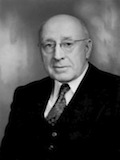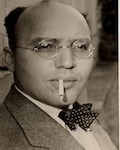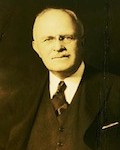U.S. Senator Elbert D. Thomas (1883-1953), Democrat of Utah and former Mormon missionary, was an outspoken advocate of rescue of Jews from the Holocaust.
Thomas grew up in Salt Lake City in the late 1800s, where his family experienced prejudice because of their Mormon beliefs, an experience that may have shaped his sympathy for the Jews. From 1907 to 1912, Thomas was a leader of the Mormon Church’s Mission in Japan. On his way home from the Far East, Thomas visited Turkish-occupied Palestine. Seeing the biblical holy sites and the efforts of the early Zionist pioneers made him a Zionist. After completing his Ph.D. and teaching at the University of Utah, Thomas plunged into politics in 1932, winning election to the first of three terms in the U.S. Senate.
When news of the Nazi mass murder of Europe’s Jews was confirmed in 1942, Senator Thomas called the rescue of refugees and Jewish statehood “the last question on which we can afford to be silent or evasive.” Thomas became active in the Bergson Group’s Emergency Committee to Save the Jewish People of Europe, signing on to its newspaper ads and co-chairing its 1943 conference on rescue. Thomas found himself at the center of a controversy the following year, when CBS Radio censored references to Palestine from a speech he made at the Bergson Group’s second emergency conference on rescue.
Senator Thomas played a key role in advancing the Bergson-initiated Congressional resolution calling for creation of a government rescue agency. Senator Tom Connally of Texas, chairman of the Senate Foreign Relations Committee, had been blocking the resolution, but when he took ill one day, Thomas quickly introduced the measure, which passed unanimously in December 1943. That contributed significantly to the pressure that persuaded President Franklin Roosevelt to create the War Refugee Board.
Sources: Wyman, The Abandonment of the Jews, pp.153, 194, 201; Wyman and Medoff, A Race Against Death, pp.88, 93.











